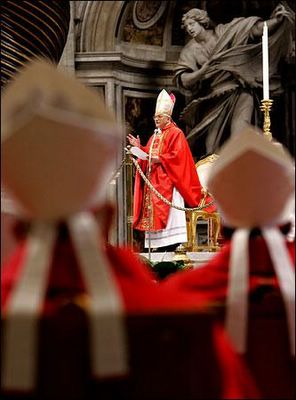Monday, April 18, 2005

Pier Paolo Cito/Associated Press
Cardinal Joseph Ratzinger asked God to give the church "a pastor according to his own heart, a pastor who guides us to knowledge in Christ, to his love and to true joy."
On the Sidelines, Catholic Liberals Still Seek a Ray of Hope
By IAN FISHER
ROME, April 16 - The idea was so preposterous that Sister Christine Schenk's first response was a long and resigned laugh. Would she and other liberal Catholics have any influence in the conclave that chooses a new pope?
"Oh, no, not at all," Sister Christine, director of FutureChurch, a coalition of progressive American Catholics, said in a telephone interview from Cleveland, where the group is based. "I think that is one of the difficulties with the conclave. Because you are a Catholic and because it doesn't happen very often, it feels like you are a team.
"But to think that there is any way to influence it is a complete fantasy." They may be idealists in general, but on this issue - the essential irrelevance of a liberal voice in this conclave - they are definite realists. Of the 115 cardinals taking part in the conclave, which begins on Monday, almost none of them have been outspoken on matters important to the liberal wing of the Catholic Church, like the ordination of women, more inclusion of laity in church business or easing bans on contraception.
Luigi De Paoli, one of the founders of We Are Church, the largest liberal church group in Europe, said his group had no cardinal inside the conclave representing its views. "We know some of them, and we think some of the most 'progressive' are in favor of our positions," he said. "But most of them are really conservative."
Still, liberals do not seem to despair (which is, anyway, a mortal sin for all stripes of Catholics). While questions like sexual morality do not appear to be on the table, that of collegiality - allowing bishops a greater say in adapting church doctrine locally - transcends the bounds of liberal and conservative. And many experts believe it will be one of the major issues discussed in the conclave, and could result in more local control, a change liberals would like.
Isaac Wüst, a liberal Catholic activist from the Netherlands, said that under Pope John Paul II, and especially in his later years, decisions came "from top to bottom, and no voices came from bottom to the top."
"Or at least no one was listening at the Vatican," he said. "That is what we want to change most of all," he added.
Like many matters facing the church, the liberal-conservative divide is not clear-cut: some liberals make the case that the conservative viewpoint dominating the Vatican and the College of Cardinals does not reflect ordinary Catholic life, and is one reason for declining church attendance in developed countries. But conservatives note that liberals do not represent all Catholics, particularly among the most devout.
Liberal groups themselves face contradictions. Although they say they represent Catholics around the world, their movements are based primarily in the United States and Europe, where church attendance is declining. In the third world, where the church is growing fastest, many Catholics remain deeply conservative, especially on sexual morality.
But even among the cardinals, easy definitions of liberal and conservative do not always fit. In the third world, many cardinals are conservative on sexual issues. In Latin America, many strongly oppose liberation theology, but are outspoken on poverty and social justice.
In Italy, one strong contender for the papacy, Dionigi Tettamanzi, the archbishop of Milan, is by most standards a conservative, especially on sexual morality, and is close to the conservative lay group Opus Dei. But he has sympathized with antiglobalists, and is outspoken on the need to find common ground with Muslims.
One progressive cardinal said the real divide in the College of Cardinals was simply between those who favored discussing delicate topics, like bioethics or sexual morality, and those who wanted them declared settled and off limits. Still, several activists said they believed that the reality of the church would force some changes.
Sister Christine noted that the dire shortage of priests and seminarians would have to be confronted. She said she hoped support would grow for the idea of married priests, and for allowing the ordination of women as deacons and someday priests.
"In the long term, our faith is with the Holy Spirit," said Linda Pieczynski, spokeswoman for Call to Action, based in Chicago, the largest Catholic reform group in the United States. "It's not with the individual men who govern the church."
"Jesus said the Spirit will always be with us," she added. "How else could the church have lasted for 2,000 years given the terrible leadership it has had at times?"
Daniel J. Wakin contributed reporting for this article.
Copyright 2005 The New York Times Company | Home | Privacy Policy | Search | Corrections | RSS | Help | Back to Top
